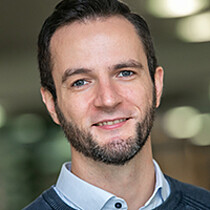

Article: Wednesday, 27 August 2025
Before AI chatbots like ChatGPT came along, you could post your technical questions on a website like StackExchange, where experts and amateurs volunteer their answers and tips about programming, science, and many other topics. Researchers from Rotterdam School of Management, Erasmus University (RSM) Dr Dominik Gutt and Dr Martin Quinn wanted to understand if these online human-to-human questions and answers will be replaced by ChatGPT, and how people are starting to adopt the use of GenAI in general. They found that the switch to using ChatGPT depends on the complexity of the question and how the questioner used forums before GenAI came along. Their findings could be useful for training other GenAI models, and the research paperHeterogeneous Effects of Generative AI on Knowledge Seeking in Online Communities has been published in the Journal of Management Information Systems.
Gutt and Quinn investigated how ChatGPT affected the number, complexity and novelty of questions asked using data from StackExchange, one of the largest Q&A platforms. The researchers classified users into three groups: casual, intensive, and top users, according to how often they asked questions on the platform in the past and compared it to how often they used it after ChatGPT became available in late 2022.
As you might expect, the number of questions posted on forums has decreased. The researchers found that questions from casual users have decreased the most – by about 18 per cent – but there’s less a drastic decrease in the number of questions from intensive and top users. Interestingly, questions from casual users have become more complex, while the questions from intensive and top users have not changed at all in terms of their complexity and novelty. “This suggests that causal users might just delegate easier questions to ChatGPT but ask more complex questions on the forum to be answered by humans. However, intensive and top users do not show this behavioural pattern,” say the researchers. It could be that casual users are mainly looking for quick answers, while committed users value the community experience.
Gutt and Quinn’s findings have important implications. Even though there are fewer questions on the platform in general, the quality of questions appears to have increased and the knowledge could be considered to be more valuable and interesting. This could make it easier for Q&A platform users to navigate subjects that have been answered – there are fewer threads but they are better quality.
For website managers and companies that rely on these Q&A platforms, this research offers an important insight: AI chatbots aren't necessarily killing these communities, but they are changing who participates and what gets discussed.
This trend also helps GenAI developers who use data from Q&A platforms to train their models, such as ChatGPT. If the data they use for training improves in quality, then so do their models. “The trend enhances our understanding of GenAI usage, it enhances the Q&A platform’s understanding of how it is affected by GenAI, and it may enhance the training data of GenAI models, which might increase GenAI quality and thereby benefit society. This helps us understand how AI tools might complement rather than completely replace human knowledge-sharing communities,” commented Dominik Gutt.
“But on the flip side, if the number of questions posted on public platforms decreases and the number on proprietary platforms like ChatGPT increases, then we lose publicly available knowledge.”


The full paper will be published this summer in the Journal of Management Information Systems. You can read the abstract here: Heterogeneous Effects of Generative AI on Knowledge Seeking in Online Communities.

RSM offers Executive Education and Master programmes in various business areas for any stage of your career. For instance:

Science Communication and Media Officer
Rotterdam School of Management, Erasmus University (RSM) is one of Europe’s top-ranked business schools. RSM provides ground-breaking research and education furthering excellence in all aspects of management and is based in the international port city of Rotterdam – a vital nexus of business, logistics and trade. RSM’s primary focus is on developing business leaders with international careers who can become a force for positive change by carrying their innovative mindset into a sustainable future. Our first-class range of bachelor, master, MBA, PhD and executive programmes encourage them to become to become critical, creative, caring and collaborative thinkers and doers.
